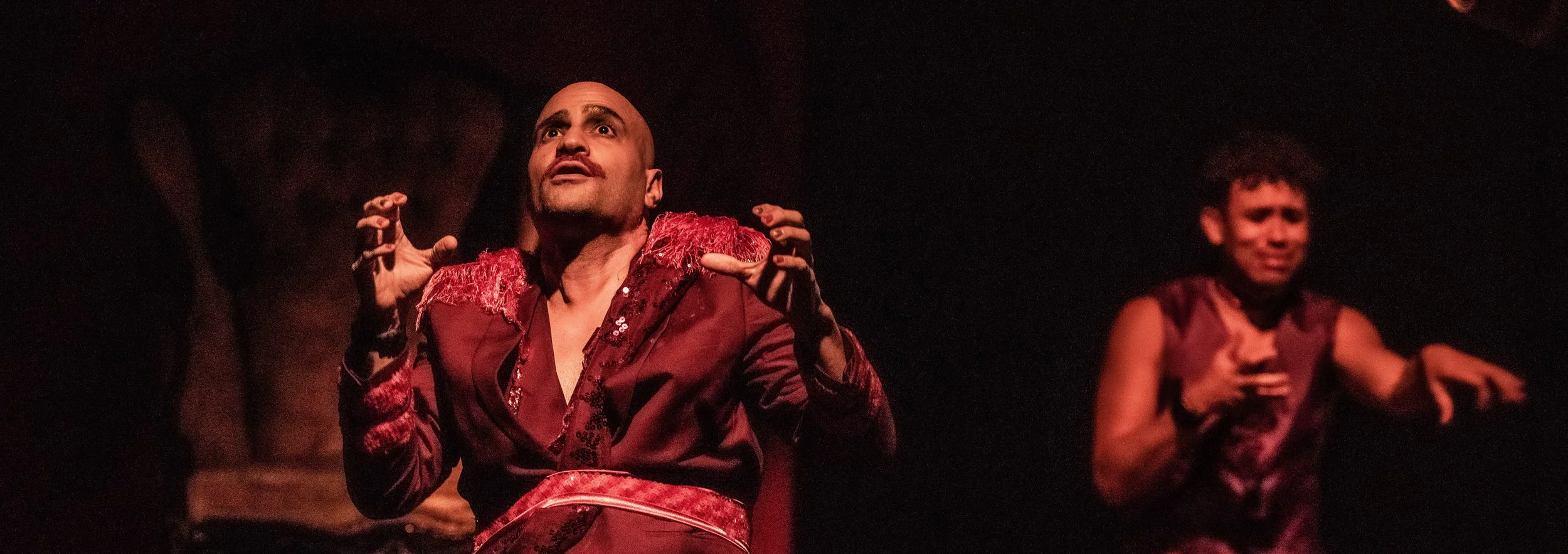At first glance, Hannah Gadsby’s Woof! feels like a show strung together with seemingly disparate threads, starting with the performer’s entrance on to the stage at the Abrons Arts Center’s Henry Street Settlement Playhouse, where Gadsby, who uses they as a pronoun of choice, opens the show with a statement about whales, of all things. The topics Gadsby covers range from popular culture to sociopolitical commentary to gender-identity politics. A newcomer to the comedian’s work might wonder how Gadsby would eventually tie these thoughts together, but their stand-ups often veer more toward TED Talk territory than a traditional stand-up structure. Still, as Gadsby promises the audience of Woof! at one point, there is a theme to all this.
Stranger Sings!
When the fourth season of the Netflix hit Stranger Things premiered this past summer, it seemed like the show’s popularity had reached its zenith. From pushing a certain decades-old Kate Bush song back onto the Billboard Hot 100 to causing fangirls to rave online about the magnetism of breakout star Jamie Campbell Bower as Stranger’s newest baddie, the show’s powerful reach could rival the telekinetic abilities of one of the series’ other iconic characters, Eleven (Millie Bobbie Brown). So it’s only natural that a musical parody of the show about superpowered teens, demonic beings and alternate dimensions would be the next step—here called Stranger Sings!, of course.
My Onliness
Echoing through the halls and into the New Ohio Theatre’s performance space is My Onliness, a daring new experimental work co-produced by the collective One-Eighth Theater, the New Ohio Theatre, and IRT Theater. Written by New Ohio’s artistic director, Robert Lyons, My Onliness takes elements inspired by Polish dramatist Stanislaw Ignacy Witkiewicz and transforms them into what One-Eighth declares as the New Absurd. And wonderfully absurd it is.
Goodbody
Despite the seemingly predictable setup of its initial premise, Joseph C. Ernst’s Goodbody cleverly subverts expectations. It opens on the striking image of a young woman waking up over a dead body, with a smoking gun in her hand and no memory of what happened just moments before. In the corner of the barn sits a man, bound in a chair—the only person who can help her remember. While this all seems like the makings of your average Quentin Tarantino-esque revenge fantasy, such appearances can be deceiving.
Raife Baker as Spencer and Amanda Sykes as Marla in Goodbody. Top: Baker with Alex Morf as Charlie Aimes. Photographs by Carol Rosegg.
After a shaky start, the play eventually finds its groove over the next hour or so, displaying an interesting dichotomy of its own to rival that of its characters. Stuck together, the gun-wielding Marla (Amanda Sykes) and chair-bound Spencer (Raife Baker) must each rely on the word of the other as means of escape from their unusual predicament.
Marla: You had me running around out there like I’m the Hardy Boys, thinking some big bad guy was gonna find us, and the whole time you were just trying to get the gun! Holy smoke.
Spencer: There is a big bad guy!
Marla: How do I know you aren’t the big bad guy?
All this is further complicated by the entrance of bumbling cop-turned-mobster Charlie Aimes (Alex Morf), who longs to be taken seriously, only to be comically undermined by his ever-constant need to unsheathe his gun from its holster (as well as by Spencer’s equally constant need to call Aimes by his vulgar childhood nickname).
Rounding out the cast of characters is the omnipotent Chance O’Leary (Dustin Charles), one-half of the O Brothers, a prominent family of Irish mobsters. In a grotesque game of show-and-tell, each vacillates between trust and doubt. Through a series of misunderstandings, a pattern begins to emerge as each character’s façade slowly fades away and all hell breaks loose.
As the play’s oddball trio of small-time criminals, actors Sykes, Baker and Morf each create a believable dynamism between them, buoying Ernst’s often nonsensical, hilarious dialogue (not an easy feat considering the various acts of violence they commit against one another throughout). Morf, in particular, provides some much-needed levity as the naive and eager-to-please Aimes—especially in scenes shared with Baker, whose Spencer acts as a quick-witted foil to his counterpart. As for Sykes, her Marla walks the line between innocent airhead and ravenous avenger with comedic ease; while Charles’s cherub-faced Chance deliciously serves both morality and malice, at once reminiscent of many a crime boss before him. (Lukas Haas in Brick and Ralph Fiennes’ Harry in In Bruges, for instance, spring to mind.)
Marla comforts an uneasy Spencer.
From physical façades to actual façades, Matthew McCarren’s set and lighting design help to not only bolster its theme of hiding in plain sight, but its claustrophobic atmosphere, as well. Taking its cue from the film world, McCarren’s subversion of the ordinary in his use of farming tools as deadly weapons helps to add stakes to the trio’s situation, especially once Chance makes his entrance. Under Melissa Firlit’s direction, the actors’ make effective, economical use of the small stage, taking advantage of McCarren’s inclusion of a ladder, one of many key props for the plot at its center. And the action in this dark comedy, whether it’s the initial, heart-pounding gunshot or the somewhat comical showdown, is helped by Cliff Williams’ fight direction, with each sequence inciting in the audience both gasps and giggles alike.
With its deftly crafted humor amid literally stomach-curdling violence, Goodbody successfully pays homage to the action-comedy genre with unabashed, bloody brio.
Goodbody plays through Nov. 4 at 59E59 Theaters (59 East 59th St., between Park and Madison, Manhattan). Evening performances are Tuesday through Saturday at 7:30 p.m.; matinees are at 2:30 p.m. Saturday and Sunday. For ticket information, visit 59e59.org.












